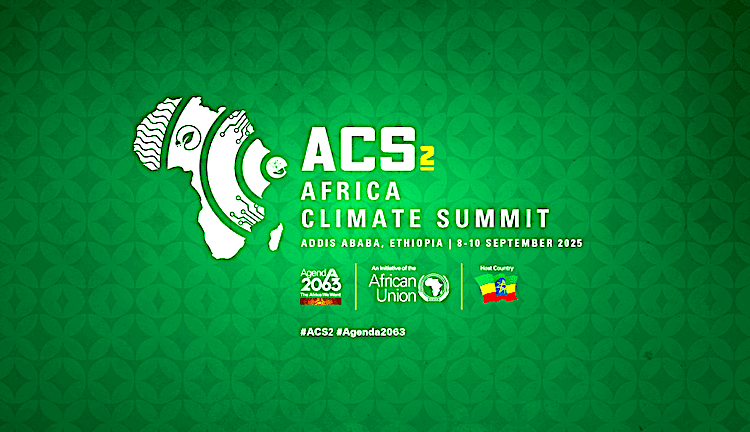By Atiklit Atnafu Naramo
The writer is a Second Secretary at the Ethiopian Embassy in New Delhi, India..
NEW DELHI | 28 August 2025 (IDN) — Ethiopia, a nation with over 3,000 years of civilisation and home to more than 80 ethnic groups, is often referred to as the “Land of Origin” owing to its status as the cradle of human ancestry. The country is set to host the Second Africa Climate Summit (ACS2) from 8 September to 10, 2025, in its capital, Addis Ababa. As the second most populous and geostrategically significant country in Africa, Ethiopia plays a significant role on the continent.

Addis Ababa is emerging as a significant diplomatic hub, frequently hosting numerous international conferences and summits. This trend is enhancing the city’s reputation as a centre for global dialogue and collaboration.
In recent years, growing concerns over climate trends and their potential impacts on both the environment and the socio-economic fabric of societies have positioned climate change as a critical topic of global discourse. Before delving into the causes, evidence, potential impacts, and adaptations related to climate change, it is essential first to understand what climate change entails.
A Pervasive Global Threat
Climate change is a pervasive global threat that has been unfolding over an extended period, with its manifestations posing significant risks to the stability of societies, as well as to natural and managed ecosystems. The rise in ambient temperatures and the alteration of related environmental processes are directly linked to increasing concentrations of anthropogenic greenhouse gases (GHGs) in the atmosphere.
While climate change can result from natural internal processes or external forces, its persistent anthropogenic influences have become increasingly evident. In the 21st century, issues such as migration, terrorism, and the proliferation of weapons of mass destruction have emerged as critical challenges that transcend national borders.
Among these, climate change stands out as one of the most formidable challenges humanity faces in its relationship with nature. The complexity of climate issues necessitates a collective global response, emphasising the urgent need for international collaboration and action to address this pressing crisis.
As a nation committed to addressing the pressing issue of climate change, Ethiopia has aligned its efforts with the goals of the Paris Agreement, which aim to limit the global average temperature increase to well below 2 °C above pre-industrial levels, and strive to limit the rise to 1.5 °C. The Ethiopian government recognises the devastating impacts of climate change on its people, environment, and economy. It is committed to taking immediate global action to enhance climate resilience and reduce greenhouse gas (GHG) emissions.
Net-Zero Emissions
Ethiopia’s long-term low emissions development strategy (LT-LEDS) aims for net-zero emissions by 2050, setting an ambitious example for others to follow. This strategy complements Ethiopia’s Climate Resilience and Green Economy strategy, which was outlined in the Ten-Year Development Plan: A Pathway to Prosperity (2021-2030). This plan aims for an annual economic growth rate of 10.2% while prioritising the establishment of a climate-resilient green economy. It includes specific targets to enhance Ethiopia’s capacity for reducing greenhouse gas emissions from 92.7 Mt CO2e to 162.3 Mt CO2e by 2030.
Despite these ambitious goals, current projections indicate that emissions may rise to between 197 and 220 MtCO2e by 2030, representing a 62-81% increase compared to 2010 levels. In response to this challenge, Ethiopia has taken significant steps under the leadership of PM Abiy Ahmed (PhD), such as green legacy initiatives that plant billions of trees every year, as well as a large-scale reforestation program targeting 700 million trees by 2025. banning the import of all internal combustion engine vehicles in 2024, becoming the first country to do so. Additionally, policies have been introduced to incentivise electric vehicle (EV) adoption, including tax exemptions and reduced import tariffs for locally assembled EVs.
The forthcoming ACS2 will be co-convened by the Ethiopian government and the African Union Commission under the theme “Accelerating Global Climate Solutions: Financing for Africa’s Resilient and Green Development.” The summit will showcase Africa-led climate solutions and focus on unlocking climate finance, positioning the continent as a key player in the global climate response.
The urgency of the climate crisis cannot be overstated; 2024 is projected to be the hottest year on record, with 2025 likely to surpass it. African nations, despite contributing less than 4% of global greenhouse gas emissions, are disproportionately affected by climate change, often spending over 5% of their GDP on climate-related responses. This diverts critical resources from essential development sectors such as health and education.
The ACS2 aims to bring together over 45 African heads of state, policymakers, scholars, and various stakeholders to spotlight Africa’s leadership and innovation in combating the climate crisis. It seeks to establish a united African voice ahead of COP30, emphasising principles of multilateralism, equity, and respect for international rights frameworks. The summit will champion partnerships that promote nature-centred investments, innovative solutions, and sustainable practices.
Support Africa in Creating Green Energy Solutions
Ethiopia calls upon the international community to support Africa in creating green energy solutions and building climate-resilient economies. The ACS2 will serve as a platform for mobilising political and financial action to address the climate crisis, advocating for reforms in the global financial system that reflect Africa’s realities and priorities, particularly in access to renewable energy and climate adaptation.
In conclusion, the ACS2 represents a pivotal opportunity for African nations to assert their leadership in global climate governance, fostering a future that prioritises sustainability, resilience, and equitable development.
ACS2 will also deepen South–South cooperation and foster a new era of global partnerships rooted in equity, innovation, and African-led solutions. The long-term impact will be a strengthened continental position that not only influences COP30 but also institutionalises Africa’s leadership in global climate governance. Through collective efforts and international support, Africa can catalyse transformative change in the worldwide response to climate change.
Climate change has no borders; our solution should not either. [IDN-InDepthNews]
Image credit: African Union


